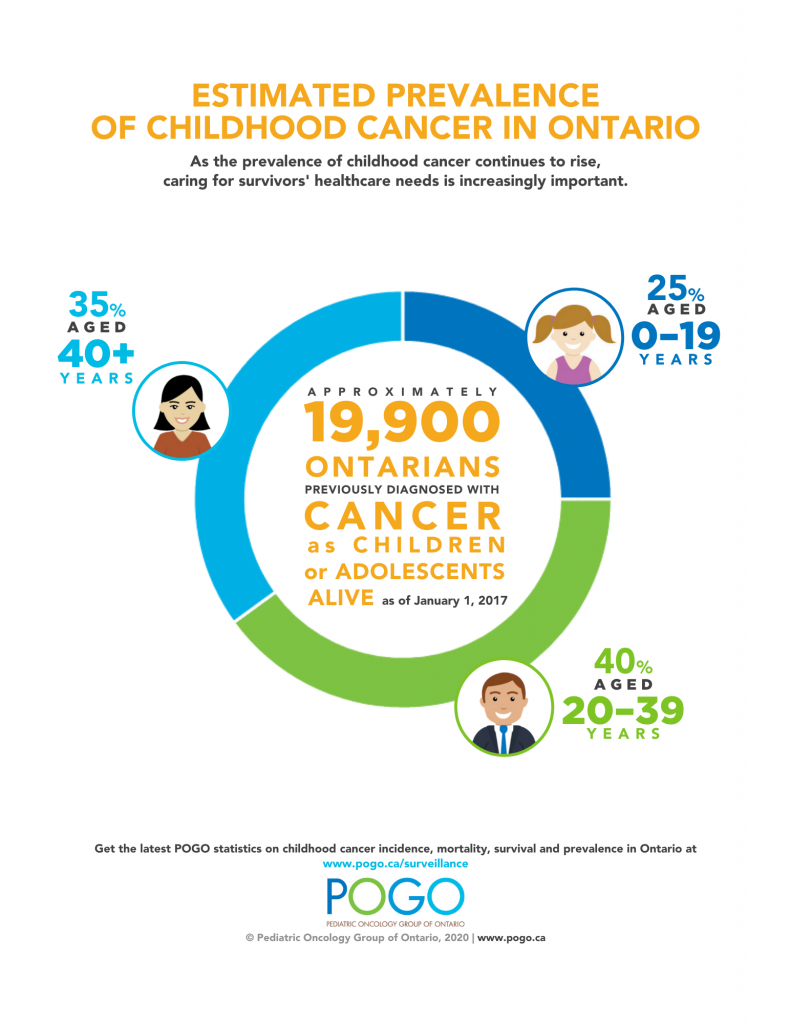Addressing the needs of childhood cancer survivors
Most children and adolescents diagnosed with cancer will survive. This means the number of childhood cancer survivors in Canada and around the world is growing. Unfortunately, many of the treatments we use to cure cancer can lead to long-term physical and mental health problems known as “late effects”. Childhood cancer survivors need lifelong follow-up care that is focused on their risks for late effects. This follow-up care will allow survivors to stay healthy and have the best quality of life possible. Our research team is focused on understanding these long-term risks and finding ways to make sure that all survivors receive the health care and other supports that they need.
Addressing the needs of adolescents and young adults with cancer
Adolescents and young adults (AYA; aged 15-39 years) are a particularly vulnerable group of cancer patients – their cancer outcomes have not improved as much as younger children and older adults. Our research program also uses Ontario’s health administrative databases and cancer registries to study outcomes in AYA with cancer from diagnosis through treatment to survivorship.
Get to know Dr. Paul Nathan
Addressing the needs of childhood cancer survivors
Most children and adolescents diagnosed with cancer will survive. This means the number of childhood cancer survivors in Canada and around the world is growing. Unfortunately, many of the treatments we use to cure cancer can lead to long-term physical and mental health problems known as “late effects”. Childhood cancer survivors need lifelong follow-up care that is focused on their risks for late effects. This follow-up care will allow survivors to stay healthy and have the best quality of life possible. Our research team is focused on understanding these long-term risks and finding ways to make sure that all survivors receive the health care and other supports that they need.
Addressing the needs of adolescents and young adults with cancer
Adolescents and young adults (AYA; aged 15-39 years) are a particularly vulnerable group of cancer patients – their cancer outcomes have not improved as much as younger children and older adults. Our research program also uses Ontario’s health administrative databases and cancer registries to study outcomes in AYA with cancer from diagnosis through treatment to survivorship.
Recent Publications
Longitudinal adherence to surveillance for late effects of cancer treatment: a population-based study of adult survivors of childhood cancer
The medical and functional burden of surviving childhood ependymoma: A population-based study in Ontario, Canada
Utility of a cancer predisposition screening tool for predicting subsequent malignant neoplasms in childhood cancer survivors.
Financial Hardship in Adult Survivors of Childhood Cancer in the Era After Implementation of the Affordable Care Act: A Report From the Childhood Cancer Survivor Study
Adherence to surveillance for second malignant neoplasms and cardiac dysfunction in childhood cancer survivors: A Childhood Cancer Survivor Study.
Increased risk of all cardiovascular disease subtypes among childhood cancer survivors: A population-based matched cohort study.
Recent Publications
Longitudinal adherence to surveillance for late effects of cancer treatment: a population-based study of adult survivors of childhood cancer
Financial Hardship in Adult Survivors of Childhood Cancer in the Era After Implementation of the Affordable Care Act: A Report From the Childhood Cancer Survivor Study
Adherence to surveillance for second malignant neoplasms and cardiac dysfunction in childhood cancer survivors: A Childhood Cancer Survivor study.
Increased risk of all cardiovascular disease subtypes among childhood cancer survivors: A population-based matched cohort study.
Source: Pediatric Oncology Group of Ontario. Childhood Cancer in Ontario: The 2020 POGO Surveillance Report. Toronto: Pediatric Oncology Group of Ontario; 2020. For more information about the burden of childhood cancer in Ontario, including statistics related to childhood cancer incidence, mortality, survival and prevalence, please see the POGO Surveillance Report.

